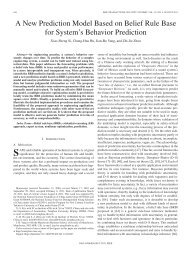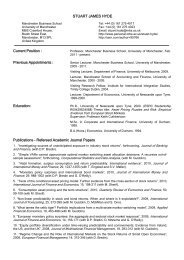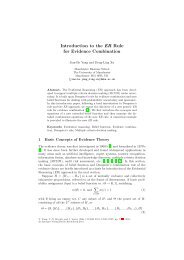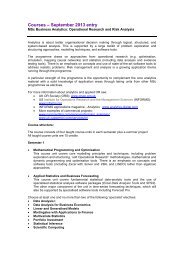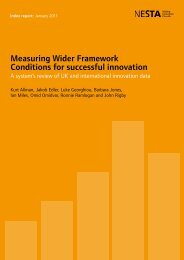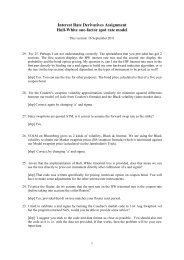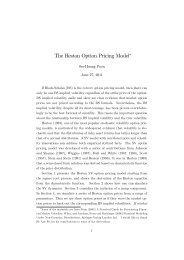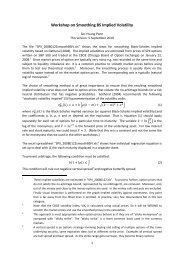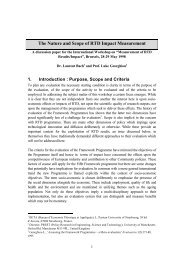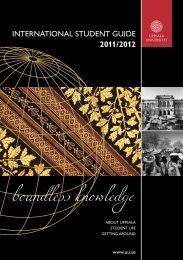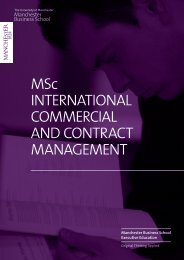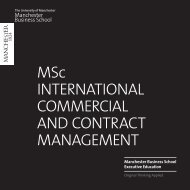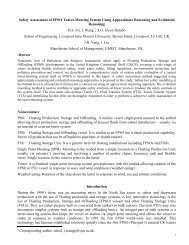Manchester Institute of Innovation Research ANNUAL REPORT ï²ï°ï±ï±
Manchester Institute of Innovation Research ANNUAL REPORT ï²ï°ï±ï±
Manchester Institute of Innovation Research ANNUAL REPORT ï²ï°ï±ï±
You also want an ePaper? Increase the reach of your titles
YUMPU automatically turns print PDFs into web optimized ePapers that Google loves.
1. Introduction and Summary<br />
In 2011, the <strong>Institute</strong> has successfully increased its income and further improved and<br />
expanded its output. This increase in research income is partly due to an increase in income<br />
from the <strong>Research</strong> Councils. We have secured a range <strong>of</strong> new projects including four<br />
significant ESRC funded projects (IPR in the Knowledge Intensive Business Sector;<br />
<strong>Innovation</strong> strategies <strong>of</strong> SMEs in the green goods sector; Consumer Responses to Eco-<br />
<strong>Innovation</strong>s; Effects <strong>of</strong> foreign acquisition <strong>of</strong> science based firms), and a NESTA funded<br />
project to compile and comment on existing evidence on innovation policy measures. The<br />
number <strong>of</strong> live projects grew from 39 to 58 in any one year for the period 2007-11.<br />
On the output side, the number <strong>of</strong> papers in high level impact journals has grown<br />
substantially. Our publication pr<strong>of</strong>ile and a shift towards more research council sponsored<br />
grants highlights our strategic focus on quality output. Simultaneously, we have maintained<br />
the high level <strong>of</strong> engagement in contract research for major stakeholders, completing 37<br />
<strong>of</strong>ficial reports in 2011 and starting a range <strong>of</strong> new projects with international stakeholders<br />
(UNESCO and the Czech Government, among others). The year 2011 has also seen the<br />
completion <strong>of</strong> a set <strong>of</strong> highly visible projects, not least in the area <strong>of</strong> Foresight where<br />
<strong>Manchester</strong> has cemented its leading role in the national and international arena for STIrelated<br />
foresight. We have intensified our contribution to academic and stakeholder<br />
conferences substantially; MIoIR staff participated in 141 conferences in 2011. MIoIR staff<br />
have also initiated a new transnational collaboration structure with colleagues from Beijing<br />
and Georgia Tech which promises to be the seed for longer term and broadening<br />
international collaboration (<strong>Innovation</strong> Co-Lab).<br />
The research theme summaries in this report and the data compilation in the back <strong>of</strong> the<br />
report give details on the range <strong>of</strong> activities.<br />
Our executive education courses have been popular, even more so than those in 2009:<br />
seventy two executives from twenty seven countries participated in four courses in 2011<br />
and there are developments underway to further broaden this activity. We have hosted<br />
twenty two academic visitors from all parts <strong>of</strong> the world in our increasingly popular MIoIR<br />
visitor programme. In the context <strong>of</strong> our PhD strategy to create world-class framework<br />
conditions for young researchers, we have also organised an Early Career Stage <strong>Research</strong>er<br />
conference, co-funded by the network EU-SPRI.<br />
We are happy to report that in 2011 we added two high calibre academics to our staff,<br />
Pr<strong>of</strong>. Edward Feser who is now Eddie Davies Pr<strong>of</strong>essor <strong>of</strong> Enterprise & <strong>Innovation</strong> at the<br />
<strong>Institute</strong> and Head <strong>of</strong> Division <strong>of</strong> <strong>Innovation</strong>, Management and Policy (previously University<br />
<strong>of</strong> Illinois); and Pr<strong>of</strong>. Bruce Tether, who returned from Imperial College London to further<br />
strengthen our team, with a focus on areas <strong>of</strong> creativity, design and skills.<br />
In January 2011 Pr<strong>of</strong>essor Jakob Edler took over the role <strong>of</strong> Executive Director <strong>of</strong> the<br />
<strong>Institute</strong>, supported by a team <strong>of</strong> four Directors (Jonathan Aylen, Dr. Paul Cunningham, Dr.<br />
Silvia Massini and Pr<strong>of</strong>. Philip Shapira). The Directors are supported by the <strong>Research</strong><br />
Coordinator Deborah Cox and a team <strong>of</strong> four administrative staff (Liz Barker, Lisa Gledhill,<br />
Wendy Walker and Siobhan Drugan). The new team established and implemented a<br />
2



